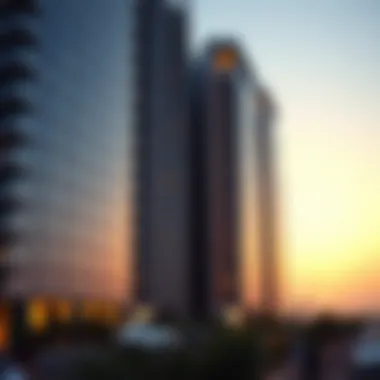Navigating Dubai's Dynamic Real Estate Landscape


Intro
Dubai's real estate market stands as a testament to rapid change and innovation, reflecting the broader dynamics of a city that continuously reinvents itself. As potential buyers, renters, and investors eye opportunities in this dazzling landscape, understanding its intricacies becomes not just beneficial but essential.
With its blend of modern skyscrapers, vibrant communities, and an ever-growing infrastructure, Dubai offers a wealth of prospects for various stakeholders. The factors influencing these shifting tides range from global economic conditions to local governance initiatives aimed at increasing foreign investments. The essence of this article lies in providing a roadmap, guiding you through current market trends, strategic investment opportunities, and the nuances that define property dealings in Dubai today.
The following sections will lay out the crux of what anyone looking to invest or settle in Dubai needs to know.
From grasping the pulse of current real estate pricing to uncovering hidden gems in emerging neighborhoods, successful navigation of this evolving landscape demands informed decision-making. Together, let’s explore these vital aspects.
Current Market Overview
The Dubai real estate market is not just an economic sector; it's a vibrant reflection of the city's ongoing evolution. This section dives deep into the current state of the market, shedding light on various elements that shape its landscape. Understanding these facets isn’t merely academic; it holds practical significance for investors, homebuyers, and even renters who are keen to make informed decisions. The analysis of the market provides vital context that helps stakeholders navigate the complexities and opportunities that exist.
Trends Shaping the Market
In recent years, a myriad of trends has emerged, each significantly altering the dynamics of Dubai's real estate market. One such trend is the accelerated push towards sustainability. More projects are incorporating eco-friendly features, driven by both a demand from buyers for greener options and government initiatives aimed at reducing carbon footprints. As a result, properties that boast energy efficiency or sustainable designs often fetch a premium in the market.
Moreover, the rise of remote work has been a double-edged sword. On one hand, it has led to a greater demand for larger living spaces that are well-suited for both work and leisure. On the other hand, it has also resulted in an exodus from city centers to more suburban areas where space is ample and costs are comparatively lower. As people reassess their living situations, understanding where the demand is strongest will be key for anyone looking to invest.
Impact of Global Economic Factors
The global economic landscape plays an undeniable role in shaping Dubai's real estate market. Fluctuations in oil prices, shifts in currency strength, and international trade dynamics all reverberate through the local economy, impacting buyer confidence and investment activity. For instance, in times of economic uncertainty, prospective buyers may adopt a more cautious approach, leading to slower transaction rates.


Additionally, the COVID-19 pandemic has left an indelible mark on the market. The initial lockdown phase caused a temporary pause, but as restrictions eased, a surge in demand for off-plan properties and luxury villas was observed. Buyers are now keenly interested in properties that offer more space and outdoor access. Global investors, too, have been on the lookout for safe havens, and Dubai often finds itself on the list due to its robust regulatory environment and potential for solid returns.
Demand and Supply Dynamics
The interplay between demand and supply is pivotal in understanding the housing climate in Dubai. Currently, the city is grappling with an oversupply of residential and commercial properties in certain areas, while other locales are booming due to increased population influx and infrastructural developments. Areas like Dubai Marina and Downtown continue to attract high levels of interest, and as urbanization trends persist, the demand for properties there remains resilient.
However, it's crucial to approach investment with diligence. Investors should consider market forecasts and the types of properties that align with emerging trends. For instance, rental yields have fluctuated based on location, and comprehensive market research is essential before committing capital.
Investment Opportunities in Dubai
Investing in Dubai real estate presents a tantalizing chance for those looking to broaden their portfolios or find a solid residential base. The city’s appeal lies not just in its striking skyline or vibrant culture but in the tangible benefits that come with investing in a booming market. Understanding the subtleties of property investments can lead to significant financial gains, and here's why diving into this market is an enticing prospect.
Dubai has become a global hub of trade and tourism, and its real estate sector is reflecting that status. From modern apartments with expansive views to luxurious villas nestled in serene environments, the opportunities are plentiful. Investors are increasingly attracted by favorable regulations, a tax-free environment, and diverse options ranging from residential to commercial properties. Nevertheless, every investment comes with its own set of risks and considerations that merit attention.
Emerging Neighborhoods
The beauty of Dubai is that it’s in a constant state of evolution, with new neighborhoods springing up that are more than just places to live; they are communities bursting with potential. Areas like Dubai Marina and Jumeirah Lake Towers have long been popular, but emerging neighborhoods such as Dubai South, Meydan, and Jumeirah Village Circle are worth a closer look. Each neighborhood offers unique features, catering to various lifestyles.
- Dubai South: Positioned as a future city within a city, this location is adjacent to the Al Maktoum International Airport and is tailored for innovation and sustainability. Investing here means having a stake in a future economic powerhouse.
- Meydan: Home to the famous Meydan Racecourse, this area combines luxury and community living. Properties here often lure affluent buyers and investors.
- Jumeirah Village Circle: Perfect for families, this neighborhood is laden with parks, schools, and commercial spaces, making it an attractive spot for rentals and long-term investments.
These emerging areas not only represent a solid investment but also underscore the trend toward community-oriented development.
Luxury vs. Affordable Segments


When one talks about real estate in Dubai, the conversation often shifts from luxury living to more affordable options. The dichotomy between luxury and budget-friendly properties is striking and offers potential investors a variety of choices.
- Luxury Segment: Here, listings such as Palm Jumeirah provide stunning waterfront views and high-end amenities. These properties can command premium prices but often see strong demand and resale values.
- Affordable Segment: Areas like Dubai Sports City and Al Furjan are capturing attention for more budget-conscious buyers. With competitive pricing and strong rental yields, these areas appeal to both expatriates and locals alike.
Thus, the choice between diving into luxury versus affordable investments really boils down to individual financial goals and market understanding. Each segment presents its own risks and returns, shaping the decision-making process for investors.
Commercial Real Estate Prospects
The commercial real estate landscape in Dubai is another frontier brimming with potential. As the city continues to attract global businesses, the demand for commercial spaces is on a noticeable rise. Investors looking to stake their claim in this sector will find plenty of opportunities in office spaces, retail shops, and mixed-use developments.
- Office Spaces: Areas like Business Bay and ** Downtown Dubai** are notable for high-rise office buildings that cater to multinational corporations and startups alike. These regions enjoy foot traffic and proximity to key business destinations, making them lucrative options for commercial investors.
- Retail Spaces: With tourism as a driving force, malls like Dubai Mall and Mall of the Emirates are focal points for retail investment. The expansion of residential areas also increases the need for local retail spaces, reflecting the growing population.
- Mixed-Use Developments: Projects that blend residential, commercial, and leisure facilities are gaining traction. These are attractive to investors as they offer multiple streams of income.
Investing in commercial real estate in Dubai is not just about numbers; it’s about being part of a dynamic and evolving landscape. A thorough understanding of the local market trends and future developments is crucial for optimizing investment returns.
The Dubai real estate market offers a myriad of choices that cater to various investor profiles. Whether one opts for emerging neighborhoods, weighs luxury against affordability, or ventures into commercial opportunities, the key to success lies in staying informed and making strategic decisions.
With persistent growth, adaptive regulations, and a cosmopolitan environment, the Dubai real estate sector continues to be a beacon for investment, whether you are a local or an international player in the market.
Legal Considerations for Buyers
Understanding the legal landscape of Dubai’s real estate market is paramount for anyone considering purchasing property in this bustling metropolis. The intricate web of laws and regulations governing property transactions can often seem daunting. Knowing these legal considerations not only safeguards one’s investment but also provides a clearer path toward successful ownership. In this section, we’ll unpack crucial elements that buyers must keep in mind.


Understanding Property Laws
The property laws in Dubai are unique, reflecting the city’s status as a global hub for trade and tourism. Ownership structures vary significantly, with regulations tailored to specific categories of buyers—including expatriates and UAE nationals.
For expatriates, it’s important to note that freehold ownership is available in designated areas, allowing foreign nationals to fully own their properties. However, there are also leasehold agreements, which can span up to 99 years. This means less commitment in terms of property rights, but it may limit long-term investment potential.
Rubber-stamping any agreement without comprehending the fine print can lead to unwelcome surprises. For instance, one might overlook certain clauses that pertain to property transfer fees or maintenance responsibilities. Thus, consulting a qualified legal advisor or realtor well-versed in Dubai’s laws is recommended. Such experts offer insights into various property types and their corresponding legal frameworks, ensuring you’re well-informed.
Regulatory Bodies and Their Roles
Dubai’s real estate market operates under several regulatory bodies that play a pivotal role in maintaining market integrity. The Real Estate Regulatory Agency (RERA) oversees the sector, ensuring compliance with established laws and regulations. This agency is responsible for monitoring real estate practices and protecting the rights of buyers and tenants alike.
Another important player is the Dubai Land Department (DLD). They handle property registration, transfers, and the issuance of title deeds. Before finalizing any property transaction, potential buyers should engage with the DLD to confirm the property’s legal standing.
Furthermore, the DLD publishes a wealth of information regarding market trends, making it a valuable resource for those looking to navigate the real estate scene effectively.
Importance of Due Diligence
In real estate, diligence is not just a buzzword; it’s an essential step in protecting your investment. Performing due diligence encompasses a range of activities that ensure a property’s legal status, suitability, and financial implications align with your expectations.
Here’s a quick overview of what due diligence might entail:
- Title Verification: Always confirm the ownership details. This helps avoid disputes.
- Check for Liens: Investigate any claims against the property that might complicate your purchase.
- Understand Local Laws: Be aware of any restrictions on property usage or zoning laws.
- Financial Implications: Analyze the complete financial statement, including additional costs like maintenance fees or homeowners’ association tariffs.
Taking these steps not only fosters peace of mind but can also save buyers from future headaches that could arise from unforeseen legal complications.
Remember: Knowledge is power in navigating Dubai's real estate scene. Ignorance can lead to unexpected pitfalls.



